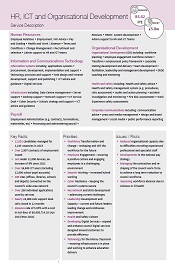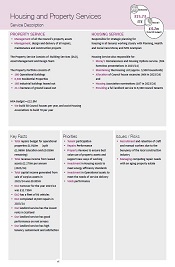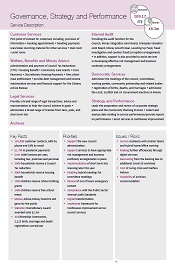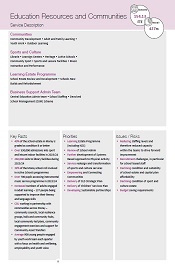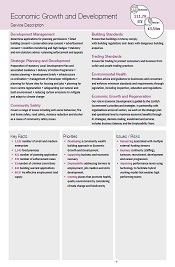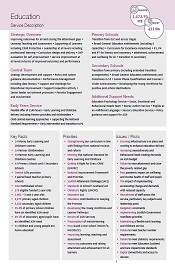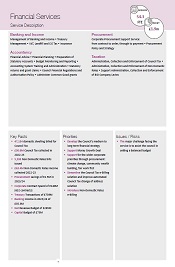Budget 2025/26
As we work through the decisions to set Moray Council’s 2025/26 budget, this page will keep you updated on the proposals and progress at each stage.
Details of consultations, engagement and feedback will be shared here as we continue our conversation with residents and staff on the Moray Council of the future.
A message from Council Leader, Cllr Kathleen Robertson (19 February 2025):
“As we near the time to agree the budget for 2025/26 I’d like to reiterate my thanks to staff and members of the public who have taken the time to engage with us throughout the process. Added to the ‘Libraries update’ drop-down menu below you’ll find the public feedback from the consultation exercise we undertook in November and December 2024. There are also some background infographics that show the usage of our facilities, condition and costs to run them.
“We very much heard what local residents had to say about previous proposals for our library services and full council has agreed to consider alternative proposals.
“Full Council meets again on 26 February to set the budget, including council tax, and the proposals being discussed can be found here.”
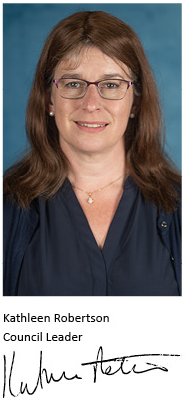
Council Leader summary statement - January statement
“Following on from our last update in December, Moray Council met on 21 January 2025 to discuss the updated budget position. We’re now able to better plan knowing our indicative grant settlement from the Scottish Government. We’ll meet again in February to set service charges for the year ahead, Council Tax levels, and the final budget.
“We’ve considered the responses and analysis from the budget survey we ran towards the end of last year and you can see the summary of key findings as well as the full results on the drop-down link below.
“My thanks, once again, to all residents who took part and engaged with us as part of this process. It helps us, as elected members, to know what’s important to you as we undertake the most difficult task of our year.”
Council Leader summary statement - December statement
“I’m grateful to everyone for taking the time to give their views on the wider budget position and the specific library proposals. I’m especially appreciative for the understanding that difficult decisions need to be made.
“While there is still considerable uncertainty around budget settlements, we’ve already approved £1.1m of savings with £0.4m more indicated. Leaving us £11.2m to find. That is not easy and it will lead to service transformation. How we transform our services is a difficult question and one that needs input from the public, which is why engaging with these consultations is so important.”
Council Leader summary statement - October statement
“In 2024/25 we were able to set a balanced budget following engagement with staff and residents. We asked for feedback on what our priorities should be in our new Corporate Plan and used your input to shape our budget and service priorities. This brought along difficult decisions on the future of services, which are set out with our updates from last year's budget.
“As we look ahead to 2025/26 and 2026/27, there’s no doubt significant challenges remain as we need to make further savings of £12.7m to bridge the gap over the next two years which is a great improvement on the savings target of £31.89m before we set the budget earlier this year. The aim of the council is to stop using reserves to balance the budget by 2027. While there is still considerable uncertainty around budget settlements, we’ve already approved £1.1m of savings with £0.4m more indicated. Leaving us £11.2m to find.
“While charges and income generation will help, we now need your input again to help focus our attention on areas of service you would like to see prioritised. This short survey is open until midnight on Sunday 3 November 2024 and will indicate willingness to see increases to charges and council tax rates, in order to protect services.
“Thank you for taking part and helping us shape the council of the future.”
Local authorities have faced a difficult financial landscape for over a decade. Since 2010/11 Moray Council has approved recurring savings of almost £80 million..
Like all councils, we’re facing further rising costs, reduced budgets and increased demand for services. Just like our household budgets, the council is experiencing soaring inflation and rapidly rising energy, goods and service costs.
When setting the budget in 2024/25 we knew that more savings would be needed this year. While the exact gap may vary, depending on grant settlements, the scale of what is needed is clear.
Savings were achieved through removal of vacant posts, operational service reductions or reducing existing posts.
It’s inevitable that services will have to be reduced further and that we may have to target our limited resources to meet greatest need. We’re continuing to think very differently about what and how we can provide services that are financially sustainable. We want to engage our community in what Moray Council of the future should be like. This is why we’re asking you to complete surveys, provide us with feedback on the future of services and keep up-to-date with budget developments via our news and social media channels.
Remind yourself about the 2024/25 budget updates and consultations, including feedback, here.
The future of the leisure and libraries services was subject to a separate public consultation, which will report back in October 2024.
Libraries
Following on from the consultation we ran in 2023 and early 2024 on various services, a service specific engagement on the future of library services was completed.
Taking account of the feedback from this, specific proposals for the future of the libraries service have been drawn up and are detailed below. These aim to provide a new model of service delivery that is financially sustainable. The survey to provide feedback has now closed. Analysis of responses will now be completed and reported to elected members to make an informed decision on current proposals early in the new year.
Full background details, context for the service transformation and the future service strategy can be found on the libraries drop-down further down this page.
Saving: £274,799 from reduced network of libraries with new community outreach service and extended opening hours at Aberlour. Keith and Dufftown buildings could generate income if sold.
Current service: Eleven library facilities across Moray offer a lending service, digital media, community spaces, shared partner resources, customer services hubs.
Libraries deliver a wide range of benefits including improving literacy, closing the gap in attainment, promoting health and wellbeing, tackling social isolation, reducing inequality, and closing digital divide. The future model being proposed would allow this to continue in a bespoke way for Moray’s rural communities.
Proposal: Retain a network of four area libraries; create a new rural community outreach service including support to community areas where there are no library branches; the continued development of the housebound service; and close seven libraries (Burghead, Cullen, Dufftown, Fochabers, Keith, Lossiemouth and Tomintoul);
This will ensure that the council:-
- Places libraries as the hub of the community for services and connectivity, conveniently located to maximise accessibility and reach.
- Makes the most of digital and creative media, use technology and digital solutions to extend and enhance services and address digital exclusion
- Libraries are resilient and sustainable through offering a combination of library services and added value services.
- Libraries are connected and informed to deliver quality customer service involving communities and partners to deliver, develop and broaden opportunities.
Potential impact: Investment in a flexible delivery of a community outreach service offers access to library services locally which responds to the accessibility and location commitments in the wider service strategy. The outreach service will be specific to local demand and tailored to community needs.
Moray Citizens Advice Bureau (CAB)
Moray CAB is affiliated to Citizens Advice Scotland and has historically been funded by a support grant from Moray Council. The current level of this grant is £117,000 a year and has remained static for a number of years. Moray CAB have used this funding to cover their core staffing/operating costs. This approach is inconsistent with a recent audit recommendation to link the payment to Moray CAB to service deliverables and performance indicators for money advice, benefits advice and housing advice.
The council also provides rent free premises to Moray CAB on a full repairing and insuring lease. The equivalent market rental value is £19,000 a year.
Saving: potentially up to £60,000 annually, subject to consideration of the impact.
Current service: Citizens Advice Scotland (CAS) is an independent charitable organisation specialising in confidential information and advice to assist people with legal, debt, consumer, housing and other problems. Nationally, around 60% of their funding comes from government sources. Local offices are responsible for their own fundraising. Some of this can be ring fenced for specific purposes. They have a core team of employed staff supplemented by a number of volunteers.
The work of Moray CAB complements Council Money Advice and Housing services. The Money Advice service within the council is a debt management service (including debtor arrangements for multiple debts) and benefits advice service for those who face financial difficulties. Although the Council is not obliged by statute to provide the service, it is recognised that there are limited alternative sources of advice on complex debt and benefit issues in Moray and this is a valued preventative service for those facing financial difficulty. Moray CAB provide independent advice on housing issues.
Proposal: Moray Council is considering a revised funding mechanism where the level of funding it provides to Moray CAB is linked only to services which contribute to the council’s statutory objectives: benefits and money advice, debt and housing.
A 40% reduction in the annual payment would be consistent with this approach however a range of funding levels representing between 20% and 64% , linked to suggested targets, are under consideration.
The above proposals are currently being consulted on with Moray CAB.
Potential impact: Reducing poverty and inequality is primary focus of the council’s Corporate Plan. Many of the services offered by Moray CAB, alongside the Council’s Money Advice/Benefits and Housing advice services, help mitigate the negative effects of poverty and inequality on the more vulnerable members of our community.
If Moray CAB were unable to source funding from elsewhere, a reduction in their funding from the Council could affect their ability to meet demand by limiting the number of staff they are able to employ and in turn the number of volunteers they can support. They have indicated that this may threaten their viability.
A reduction in Moray CAB’s ability to meet demand could have a knock on effect for Council money advice and welfare benefit advice services. If Moray CAB were to close then the Council would need to find alternative provider for independent housing advice.
a year)
Moray CAB ran a consultation on the potential impact of a reduction in funding with their service users. The survey to provide feedback has now closed.
Consultation findings
To inform our Corporate Plan, residents were asked about the Council Vision and Priorities, of which around 95% of respondents agreed with. The Council approved its Corporate Plan in February 2024. Progress against actions and key performance indicators is reported in the links below.
In our previous survey, participants were asked about a Council Tax rise, with the choice to make between 3% and 15% at 1% increments. The First Minister announced to freeze council tax for 2024/25 so no increases could be made in this area.
- When participants choices were averaged the increase to Council Tax was 6%.
- 60% of all participants indicated a ‘willingness’ to see Council Tax rise by more than 3%, 40% of all participants indicated a rise of 6% or more and 20% of all participants a rise of 10% or more.
- There was variance across different groups, most noticeable within the 0-16 group where more than half were ‘willing to see rises of 8% or more.
In our previous survey, participants were asked their willingness to increase service charges in specific areas (Leisure and Sports, Secondary School meals, Household Garden Waste permits & Burial charges to recover the cost of service).
- 60% of participants, or more, were willing to see some form of increase in charges but more so in Leisure & Sports and Burials than in Secondary School meals and Garden Waste permits. More than half of participants were willing to see moderate to significant increases within Leisure & Sport services.
- 41% of participants indicated they would be willing to accept the introduction of parking changes for areas not previously charged.
- Although Household Garden Waste Permits has the least ‘appetite’ for increase, almost 60% of participants showed willingness for some increase.
In our previous service, participants indicated their willingness to reduce spending / level of service delivery.
- One third of participants indicated their willingness to see some form of reduction across all service areas.
- A more significant proportion of participants indicated their willingness to see reductions in standard and level of service over those indicating no change within Catering services (55%), Economic Growth & Development Services (Regulatory Services), Climate Change and Economic Development (64%), Housing Services (56%), Communities Services (57%) and Library Services (55%). In the same service areas there was a greater willingness to see moderate – significant reductions, particularly within Economic Growth and Development Services (Regulatory Services, Climate Change and Economic Development) (47%).
- Half of participants indicated they’d be willing to see reductions within Mental Health and Drug & Alcohol Services (50%) and almost a third (33%) would be willing to see Moderate – Significant reductions.
- Almost half of participants indicated they’d be willing to see reductions in Schools – Learning Estate (46%) and Leisure Services (46%).
- The least willingness to see reductions (No Change) was within Primary (64%), Secondary (63%), ASN Services (67%), Social Care Services for Adults (63%), Road Repairs (61%), Roads Winter Maintenance (66%) and Bins & Recycling (60%)
Using the feedback received to the consultations in 2023/24, decisions were made on service specific proposals. These included:
- An uplift in charges to fully recover the cost for the burials service, saving £165,000 a year. As supported by 65% of survey respondents.
- Withdrawing from the school catering Food for Life scheme, saving £70,000 a year. Just under 55% of survey respondents supported a reduction in this service.
- Introducing dynamic pricing in schools to respond to market trends, keeping the cost of a meal within the free school meal allowance but saving £5,000 a year. Just over 60% of survey respondents supported this action.
- Reduction in street lighting maintenance due to the introduction of LED lights resulting in less faults being reported, will save £25,000 in the first year. Just under 40% of survey respondents supported some reduction in this service.
- Reduction of opening hours of Household Waste and Recycling Centres, closing one weekday each and saving £25,000 a year. Supported by 77% of respondents, of which 42% indicated there would be limited impact on them.
- Reduction of support for animal health services within Environmental Health giving a saving of £30,000 a year.
- Taking a commercialised approach to industrial rent (following existing rent review cycles) gave a saving of £65,000 a year.
- A reduction in the community training budget and capacity for participatory budgeting support saved £90,000 a year.
- Customer services: reduce size of staff team (two posts currently vacant). Saving = £114,000 a year.
- Outdoor learning: reduce the service that supports outdoor learning and the Duke of Edinburgh award scheme. Saving £115,000 a year, now revised to £58,000 a year.
- Mobile libraries: retire the mobile library bus alongside development of an alternative service delivery model. Saving = £20,000 a year.
Savings were achieved through removal of vacant posts, operational service reductions or reducing existing posts. The future of the leisure and libraries services was subject to a separate public consultation, which will report back in October 2024.
Community engagement on the budget priorities for 2025/26 ran from 17 October until 24 November 2024. A total of 718 opened the survey and 552 completed all compulsory closed questions.
Participants were asked to select what they thought was a reasonable increase in Council Tax between the range of 7% and 15%.
Three further questions were asked regarding the increasing of service charges for leisure & sports services, Secondary School meals and garden waste permits.
Participants were asked to select their willingness, using a five-point scale between 0 (No change) and 4 (Significant increase).
Fourteen questions were asked regarding reducing spending, standard or level of service delivery across various provisions in the council. Participants were asked to rank the importance, using a five-point scale between 1 (Not important) and 5 (Extremely Important).
Key findings
The full results and analysis of the survey can be found here with key findings summarised below.
- When participants choices were averaged the increase to Council Tax was 9.0%.
- Showing tolerance ranges, respondents were willing to see Council Tax increases of –
7% 46%
8-10% 37%
11-15% 17%
- Respondents indicated an appetite for small-moderate increases in charges for Leisure & Sports (66%) and Secondary School Meals (56%), by choosing a score of 1-3.
- Nearly half (42%) of respondents wanted to see ‘No Change’ to the cost of Household Garden Waste Permits.
Red being the most important and green being the least important.
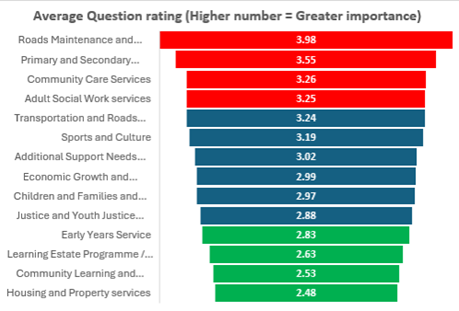
As part of the survey, one open-ended question asked participants for any comments and suggestions that may help Moray Council make savings or increase income. 235 of respondents chose to leave a comment and/or suggestion. From these responses 245 suggestions regarding possible savings and 99 about increasing income were made.
Savings: 47 suggestions were around reviewing current work practices, becoming more efficient and reducing staff levels as a result. 31 were similar but focused on reviewing and reducing management.
Income Generation: 19 suggestions covered increasing either current charges or introducing new charges for services. This included, school transport, recycling centres, library events, day services, housing repairs, public toilets and leisure. Increasing council tax was the second highest suggestion with several responses stating they would rather pay more than lose or face cuts to frontline services.
Moray Council continues to face a very difficult financial situation with initial savings being proposed to support the £12.7m required over the next two years.
On 22 October 2024, Full Council agreed further opportunities for savings.
The next set of measures to be considered to reduce spending are detailed below. This may involve consultation with the workforce and wider public before the council makes a final decision.
The budget measures cover the following areas:
| Service | Savings achieved by |
| Environment and Commercial Services |
|
| Finance |
|
| Education |
|
On 4 December 2024, Full Council agreed to consider the following further savings proposals:
| Service | Savings achieved by |
| Education: Early Learning and Childcare |
|
| Education Resources and Communities |
|
| Governance, Strategy and Performance |
|
| HR, ICT and OD |
|
| Environmental and Commercial Services |
|
| Housing and Property |
|
| Finance |
|
| Economic Growth and Development |
|
The public feedback to Nov/Dec 2024 consultation can be seen here. The infographics below help put the story of our libraries into context.
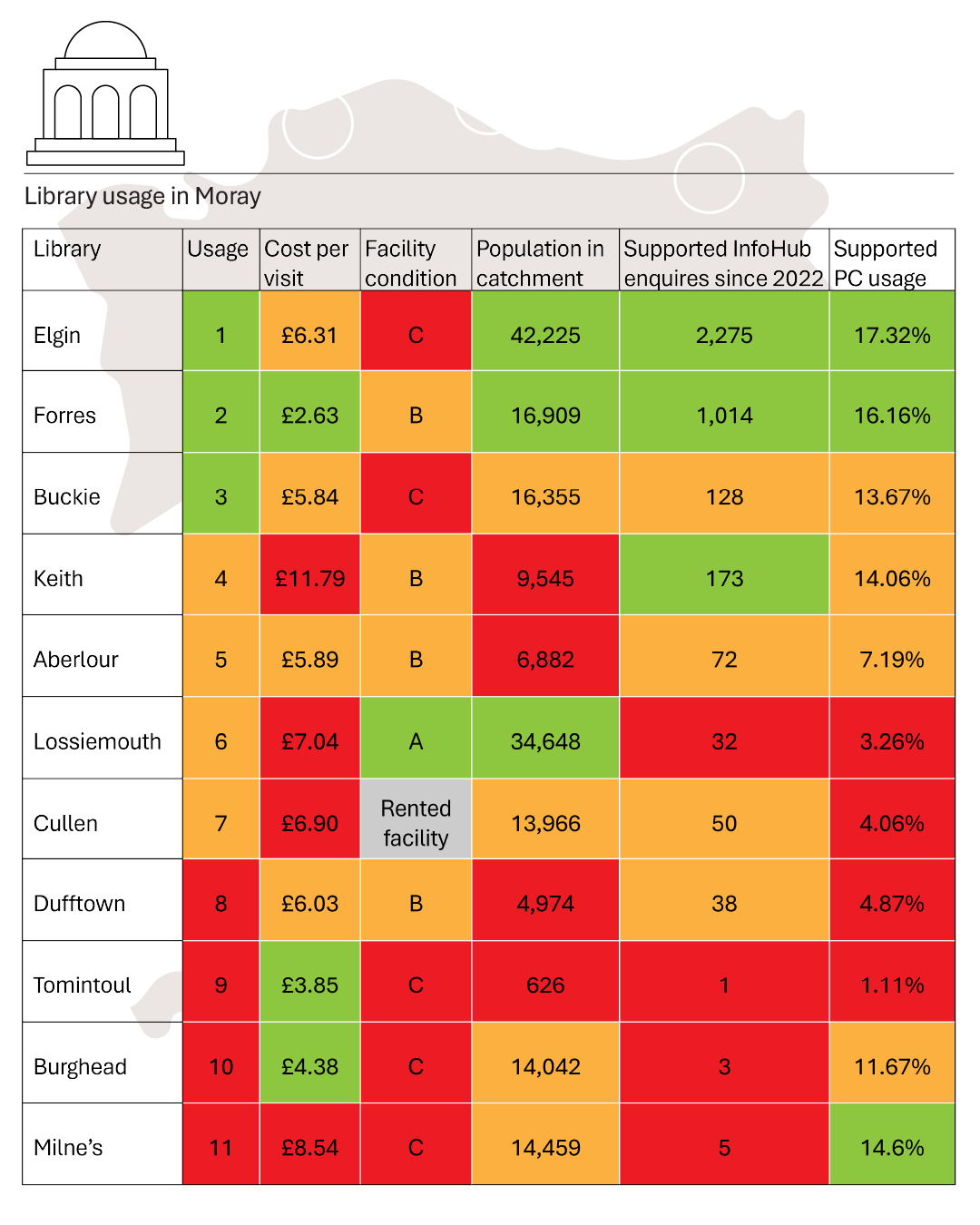
Map of Libraries:
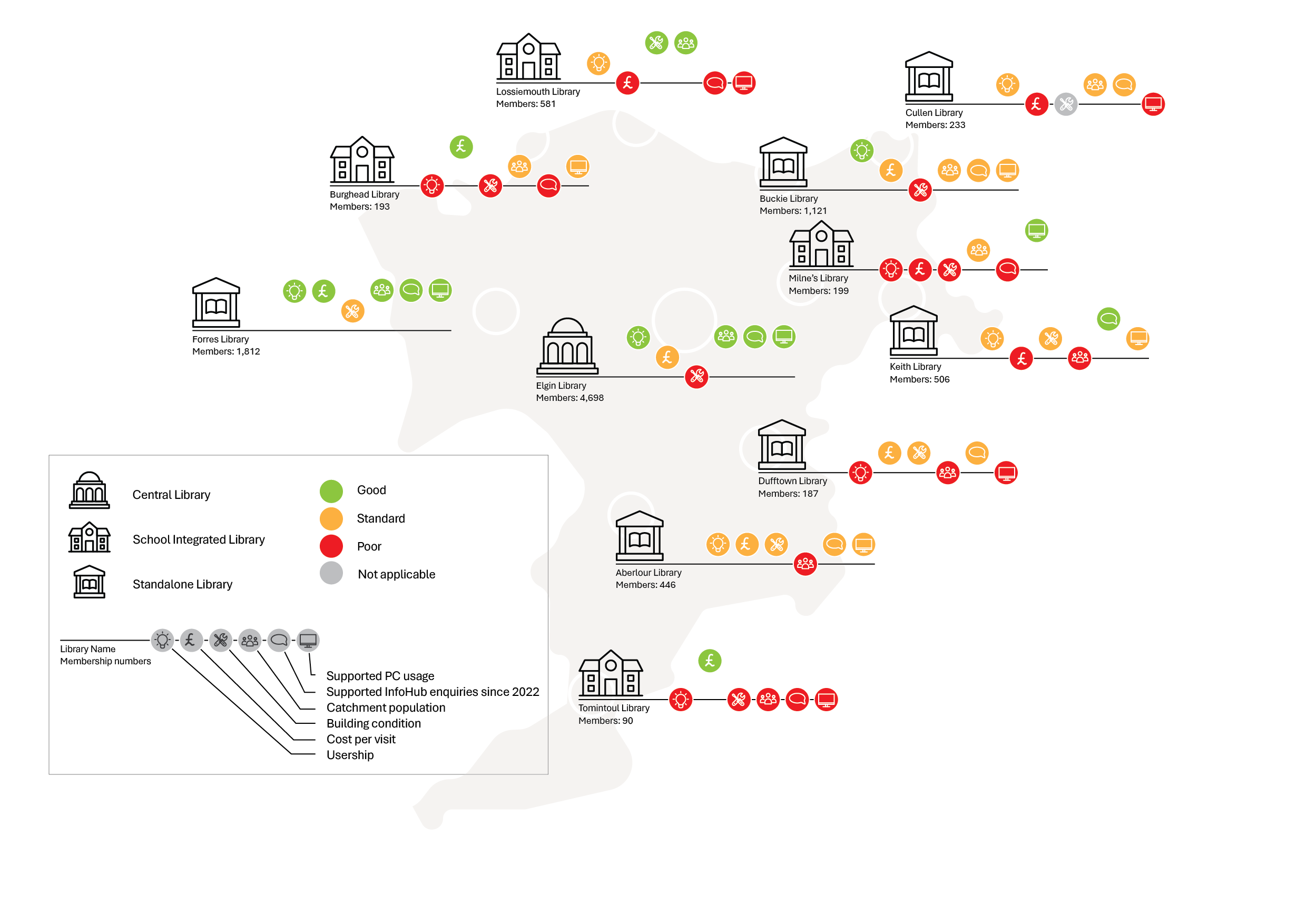 Previous Library Update:
Previous Library Update:
Library facilities across Moray are free to enter, open to all where people can explore and share reading, information, knowledge and culture. Libraries have seen many changes over time, from shifts towards digital media, community spaces, shared partner resources, becoming customer services hubs.
Libraries deliver a wide range of benefits including improving literacy, closing the gap in attainment, promoting health and wellbeing, tackling social isolation, reducing inequality, and closing digital divide. The redesigned future model being proposed would allow this to continue in a bespoke way for Moray’s rural communities while adapting to modern needs.
The Libraries, Learning Centre and Heritage team has been on a transformation journey for the past three years and is continue on this journey. As part of this pathway a transformation and future services strategy has been developed as well as service delivery options.
The council’s wider vision is for a Moray where people prosper, free from poverty and inequality with libraries following this vision for:
- Our young people grow up safe, well-educated and reach their full potential
- People lead healthy lives and have access to quality care when they need it
- Our businesses and communities prosper
- We leave a better environment for future generations
Since September 2023, three methods of engagement to explore budget savings/service redesign for this team have been undertaken. The first stage was a series of six drop-in sessions at leisure and library facilities in November 2023 that coincided with the opportunity to complete an online or paper public survey on both service areas.
A summary of the key findings and feedback that has been taken into consideration as part of service redesign is as follows:
- 94% of respondents stated they visited a library to borrow or look at books/magazines; 29% to access computers, printers or Wi-Fi; and 28% to attend events and activities.
- More than half (53.1%) stated that libraries had helped them ‘Develop new interests, access information’; and 39.5% indicated they had learned new skills by attending libraries. Requirement to ensure the service offers a combination of core library services and added value services. 86% not prepared to travel longer than 20-30mins to access a library. Through retaining the identified four branches almost all of the Moray population would fall within a 20 minute journey with only four of our 124 population settlements be outwith a 20min drive catchment of a Moray library.
- Several responses indicated support for implementing charges for some services, increasing marketing, stopping ancillary services such as events/activities and retaining core service only.
A summary of the key proposals and feedback from a staff engagement session in November 2023 are as follows:
- Review opening hours as quieter evening periods and seasons. Part of Change Management Plans currently being taken forward.
- Introduce charges or deposit options for usage of services/items.
- Reviewing functions within the service i.e. PC usage, ICT efficiencies, standardisation of processes and delivery methods across branches.
- Energy efficiency improvements of branches.
A number of these staff proposals have been actioned or embedded in the team action plan for 2024/25.
The third and final method of engagement was a stakeholder workshop which took place in February 2024. This workshop comprised of national, regional, and local partners, local community group representatives and customers/users of the service. The stakeholder workshop can be summarised as follows:
- Sponsorship and advertising in library facilities and moving more services into library facilities were the most tolerable options identified at the workshop. Neither of these would be ‘quick wins’ within timescales to contribute to budget savings.
- Use pre-existing data to justify reduced hours or closures.
- If closing a library facility provide a programme of community pop-ups instead of a book drop off service.
- Public transport provision was a recurring key factor to consider in regards to future service changes. Discussions with m.connect service to support transportation of customers to the remaining libraries.
Moray Council is consulting on the future transformation of the library service to make sure libraries, learning centres and heritage services are fit for the future, while operating within a sustainable, affordable budget.
The future service model to deliver the new Libraries, Learning Centres and Heritage Service is summarised below:
- Network of four Area Libraries (Elgin, Buckie, Forres and Aberlour) providing a hub for services across Moray.
- Increased opening hours for Aberlour Library.
- New rural community outreach service, including service to seven community areas where branches are proposed to close (Burghead, Cullen, Dufftown, Keith, Lossiemouth, Milnes (Fochabers) and Tomintoul) and more. Outreach services are tailored to local needs, for example:
– Activities and programmes delivered to specific groups, community pop up library services with a range of resources and support/advice, event attendance/support, digital inclusion by access to device borrowing. - Continued development of the housebound service.
- Restructure centrally based staff to align with future service delivery.
These elements represent an overall operating cost of up to £275,000 less than the current delivery model.
For context, 2023/24 data for current libraries is noted below:
| Facility | Proposed revised service | Facility Usage per Head of Locality Population (Associated School Group ASG) | Operating Hours/Week | Facility Condition |
| Elgin | Retain | 5.08 | 56 | Grade C - poor |
| Buckie | Retain | 1.79 | 36 | Grade C - poor |
| Forres | Retain | 3.25 | 36 | Grade B - satisfactory |
| Aberlour | Retain and expand hours | 0.94 | 16 | Grade B - satisfactory |
| Burghead | Outreach | 0.17 | 8 | Grade A - good |
| Cullen | Outreach | 0.24 | 12 | |
| Dufftown | Outreach | 0.33 | 10 | Grade B - satisfactory |
| Keith | Outreach | 1.35 | 30 | Grade B - satisfactory |
| Lossiemouth | Partial outreach/ use as school resource | 0.46 | 16 | N/A |
| Milnes (Fochabers) | Partial outreach/ use as school resource | 0.28 | 10 | N/A |
| Tomintoul | Partial outreach/ use as school resource | 0.3 | 11 | N/A |

